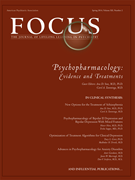Advances in Psychopharmacology for Anxiety Disorders
Abstract
Anxiety disorders are among the most prevalent psychiatric disorders, but compared with mood and psychotic disorders, are understudied in terms of newer pharmacotherapeutic approaches. Certain anxiety disorders, such as generalized anxiety disorder, and related conditions such as posttraumatic stress disorder (PTSD), may be refractory to the approved first-line treatments, like selective serotonin reuptake inhibitors (SSRIs) and serotonin norepinephrine reuptake inhibitors (SNRIs). Here we will review the most recent pharmacological treatment modalities under investigation for anxiety disorders and related conditions such as PTSD. The review includes a discussion of neurotransmitter and peptide pathways. We will present novel treatment options from medication classes that are widely studied in anxiety, such as the serotonin and gamma-aminobutyric acid (GABA) system, and also more novel mechanisms like glutamate modulators (e.g., ketamine, riluzole and d-cycloserine), corticotropin releasing factor and vasopressin receptor antagonists, neuropeptides such as neuropeptide Y and oxytocin, anticonvulsants such as pregabalin and gabapentin, mifepristone, and adrenergic agents such as propranolol and prazosin. Our review of the literature suggests that while there are some agents under investigation that may appear promising in the future, most of them are relatively early in development and there are very few new medications that carry immediate promise for the treatment of anxiety disorders. We hope this review encourages further investigation of novel therapeutics for anxiety, focusing primarily on new drug development of nonmonoamine and peptide systems.



